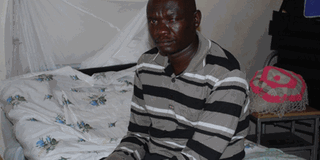Eye care burden heavy on Acholi region

Eye patients like Charles Okech (above) travel long distances before they can access eye specialists. Photo by Moses Akena.
What you need to know:
People who need access to eye care are constrained by the lack of specialists, expensive medication and poor funding to eye health in the country.
At 41 years, Charles Okech may become permanently blind if an operation to correct a defect on his right eye proves unsuccessful. His is a case of two unfortunate incidents, the first in 1983, when while sharpening a pencil, the razor blade hit his right eye after a struggle with a playful classmate who was grabbing the pencil from him.
Since then, he has been relying on his left eye. However, on June 1 this year while slashing in his banana plantation in Bweyale, Kiryandongo District, a flying stone hit his left eye and slightly injured it.
But elders convinced him that the incident was the work of witchcraft, and he needed to apply local herbs instead of applying the medicine he had got from a health facility. Within hours, his vision had blurred and the eye developed a cataract.
He was admitted to Gulu Regional Referral Hospital eye department and joins a growing list of people with eye problems in the district and countrywide.
At least 50 people with eye defects visit the department, daily.
Dr Ben Watmon, the lead ophthalmologist at the hospital says the common eye diseases in the region are cataract trachoma, onchocerciasis, corneal scars, glaucoma, uveitis and optic nerve error. Last year alone, eye specialists attended to over 50,000 eye patients.
Gulu, just like many districts in the country, has since 2005 been relying on Lions Aid Norway for eye equipment, human resource capacity and outreaches to several districts. However, within two years, the funding will be no more.
Funder throws in towel
Announcing the end of the project during a workshop for district leaders in the Acholi sub region in Gulu recently, the acting executive director of Lions Aid Norway, Jan Erik Larsen, said they will see that most districts get eye care equipment and Ophthalmic Clinical Officers before they pull out.
Mr Larsen, however, advised districts to look for alternative sources of funding and prioritise eye care in their planning. Dr Patrick Turyaguma of the Disability Prevention and Rehabilitation Section of the Ministry of Health commended Lions Aid for their support. “Provision of eye care services is very expensive. Even the drugs are very expensive, that is why in most countries eye care relies on development partners,” said Dr Watmon.
In addition, the personnel handling the diseases are in most cases lacking. For instance, most districts in the region are operating without Ophthalmic Clinical Officers (OCOS).
In the rural areas like Kiryadongo, where Okech comes from, access to eye care is limited by the lack of specialists.
Conditions for eye infection prevalent
This, according to Dr Turyaguma, shows that the conditions that lead to trachoma have a high presence in the region.
“We are rolling out a programme to eliminate the disease from the endemic districts by using the Surgery, Antibiotics, Facial Hygiene and Environment Sanitation (SAFE) strategy that was designed by WHO,” he said.
The ministry hopes the programme which started in 2006, will reach at least 36 districts by the end of this year.Despite this need, Dr Watmon said eye care is very dynamic with new equipment coming up, time and again, hence the need to have refresher training for the medical personnel. Gulu Hospital requires new equipment which Lions Aid has promised to provide.
Countrywide, at least one per cent of Uganda’s estimated population is blind.




